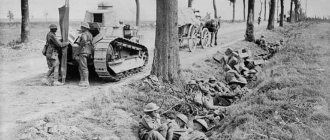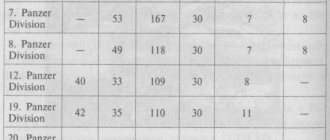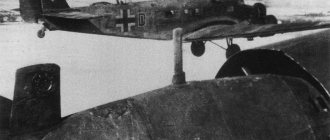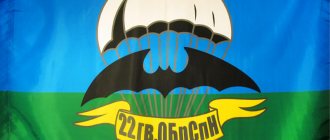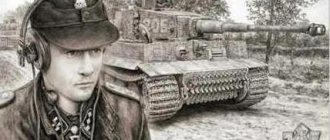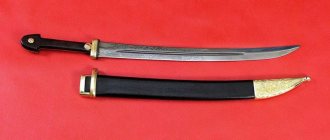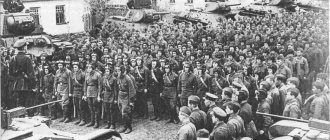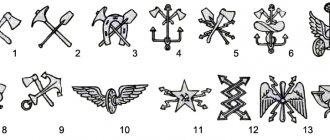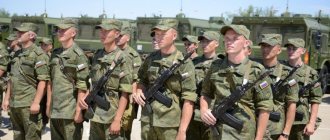Arabesque
Shoulder strap
Sleeve badge
Rank insignia Dick
(Army, Ground Forces)
General of Tank Forces
(German:
General der Panzertruppe
) - official military rank of general in the German Armed Forces (Wehrmacht, Bundeswehr).
In the Wehrmacht, the rank of general of tank forces
was in seniority between lieutenant general and colonel general.
It is more correct to call this rank “general of the military branch”, because it was equated to ranks, that is, the military rank of a certain military position:
Heer
- General of Infantry (German: General der Infantrie
) - General of the Cavalry (German: General der Kavallerie
) - General of Artillery (German: General der Artillerier
) - General of the Mountain Troops (German: General der Gebirgstruppe
) - General of the Engineering Troops (German: General der Pioniertruppe
) - General of the Signal Corps (German: General der Nachrictentruppe
) - General Ober Stabsarzt (German: Generaloberstabsarzt
)
Luftwaffe
- General of Aviation (German: General der Flieger
) - General of the Anti-Aircraft Forces (German: General der Flakartillerie
) - General of the Parachute Troops (German: General der Fallschirmtruppe
) - General of the Aviation Signal Corps (German: General der Luftnachrichtentruppe
) - General of the Luftwaffe (German: General der Luftwaffe
)
Introduced in 1935.
In the SS troops, it corresponded to the rank of Obergruppenführer and Waffen-SS general.
In the tank forces of the Bundeswehr, the general of the tank forces
is the head of the armored forces training center in Munster.
List of generals of tank forces
Generals of the Wehrmacht tank forces
| Image | Name | Production | Notes |
| arnim !Hans-Jürgen von Arnim (German: Hans-Jürgen von Arnim ; 1889–1962) | 1941-12-17 !17.12.1941[1] | Colonel General (from 12/04/1942) | |
| balck! Hermann Balck (German: Hermann Balck ; 1893–1982) | 1943-11-01 !01.11.1943[2] | ||
| Bright !Hermann Breith (German: Hermann Breith ; 1892–1964) | 1943-03-01 !01.03.1943[3] | ||
| Brandenberger !Erich Brandenberger (German: Erich Brandenberger ; 1882–1955) | 1943-11-08 !08.11.1943[4] | general of artillery (from 01.08.1943) | |
| wreath! Walter Wenck (German: Walther Wenck ; 1900–1982) | 1945-04-06 !06.04.1945[5] | ||
| Schweppenburg !Leo Geyr von Schweppenburg (German: Leo Freiherr Geyr von Schweppenburg ; 1886–1974) | 1941-06-04 !04.06.1941[6] | general of cavalry (from 04/01/1940) | |
| Gräser !Fritz-Hubert Gräser (German: Fritz-Hubert Gräser ; 1888–1960) | 1944-01-01 !01.09.1944[7] | ||
| Guderian ! Heinz Guderian (German: Heinz Guderian ; 1888–1954) | 1938-11-01 !01.11.1938[8] | Colonel General (from 07/19/1940) | |
| Decker !Karl Decker (German: Karl Decker ; 1897–1945) | 1945-01-01 !01.01.1945[9] | ||
| Saucken! Dietrich von Saucken (German: Dietrich von Saucken ; 1892–1980) | 1944-08-01 !01.08.1944[10] | ||
| Senger und Etterlin! Fridolin von Senger und Etterlin (German: Fridolin von Senger und Etterlin ; 1891–1963) | 1944-01-01 !01.01.1944[11] | ||
| Kempf! Werner Kempf (German: Werner Kempf ; 1886–1964) | 1941-04-01 !01.04.1941[12] | ||
| Kessel !Mortimer von Kessel (German: Mortimer von Kessel ; 1893–1981) | 1945-03-01 !01.03.1945[13] | ||
| Kirchner! Friedrich Kirchner (German: Friedrich Kirchner ; 1885–1960) | 1942-02-01 !01.02.1942[14] | ||
| Kleemann !Ulrich Kleemann (German: Ulrich Kleemann ; 1892–1963) | 1944-10-20 !20.10.1944[15] | ||
| Knobelsdorff !Otto von Knobelsdorff (German: Otto von Knobelsdorff ; 1886–1966) | 1942-08-01 !01.08.1942[16] | ||
| Kramer !Hans Kramer (German: Hans Cramer ; 1896–1968) | 1943-05-01 !01.05.1943[17] | ||
| Crüwell !Ludwig Crüwell (German: Ludwig Crüwell ; 1892–1958) | 1941-12-01 !01.12.1941[18] | ||
| Krüger !Walter Krüger (German: Walter Krüger ; 1892–1973) | 1944-04-01 !01.04.1944[19] | ||
| Kuntzen !Adolf-Friedrich Kuntzen (German: Adolf-Friedrich Kuntzen ; 1889–1964) | 1941-04-01 !01.04.1941[20] | ||
| Kühn !Friedrich Kühn (German: Friedrich Kühn ; 1889–1944) | 1942-09-10 !10.09.1942[21] | ||
| Langermann und Erlenkamp !Wilibald von Langermann und Erlenkamp (German: Willibald Freiherr von Langermann und Erlencamp ; 1890–1942) | 1942-06-01 !01.06.1942[22] | ||
| Lemelsen! Joachim Lemelsen (German: Joachim Lemelsen ; 1888–1954) | 1941-06-04 !04.06.1941[23] | general of artillery (from 01.08.1940) | |
| Lüttwitz! Smilo von Lüttwitz (German: Smilo Freiherr von Lüttwitz ; 1895–1975) | 1944-09-01 !01.09.1944[24] | ||
| Lüttwitz ! Heinrich von Lüttwitz (German: Heinrich Freiherr von Lüttwitz ; 1896–1969) | 1944-11-01 !01.11.1944[25] | ||
| Lutz ! Oswald Lutz (German: Oswald Lutz ; 1876–1944) | 1935-11-01 !01.11.1935[26] | ||
| Manteuffel !Hasso von Manteuffel (German: Hasso von Manteuffel ; 1897–1978) | 1944-09-01 !01.09.1944[27] | ||
| Maus !Karl Mauss (German: Karl Mauss ; 1898–1959) | 1945-04-01 !01.04.1945[28] | ||
| model !Walter Model (German: Walter Model ; 1891–1945) | 1941-10-01 !01.10.1941[29] | Colonel General (from 02/01/1942), Field Marshal General (from 03/01/1944) | |
| Nehring !Walther Nehring (German: Walther Nehring ; 1892–1983) | 1942-07-01 !01.07.1942[30] | ||
| Paulus ! Friedrich Paulus (German: Friedrich Paulus ; 1890–1957) | 1942-01-01 !01.01.1942[31] | Colonel General (from November 20, 1942), Field Marshal General (from January 30, 1943) | |
| Reinhardt !Georg-Hans Reinhardt (German: Georg-Hans Reinhardt ; 1887–1963) | 1940-06-01 !01.06.1940[32] | Colonel General (from 01/01/1942) | |
| Röttiger !Hans Röttiger (German: Hans Röttiger ; 1896–1960) | 1945-01-30 !30.01.1945[33] | ||
| Rommel !Erwin Rommel (German: Erwin Rommel ; 1891–1944) | 1941-07-01 !01.07.1941[34] | Colonel General (from 01/30/1942), Field Marshal General (from 06/22/1942) | |
| volumes !Wilhelm von Thoma (German: Wilhelm Ritter von Thoma ; 1891–1948) | 1942-11-01 !01.11.1942[35] | ||
| fayel! Rudolf Veiel (German: Rudolf Veiel ; 1883–1956) | 1942-04-01 !01.04.1942[36] | ||
| hair dryer! Gustav Fehn (German: Gustav Fehn ; 1892–1945) | 1942-11-01 !01.11.1942[37] | ||
| first! Gustav von First (German: Gustav von Vaerst ; 1894–1975) | 1943-03-01 !01.03.1943[38] | ||
| Fessmann !Ernst Feßmann (German: Ernst Feßmann ; 1881–1962) | 1937-09-30 !30.09.1937[K 1] [39] | ||
| Vietinghoff ! Heinrich von Vietinghoff (German: Heinrich von Vietinghoff ; 1887–1952) | 1940-06-01 !01.06.1940[40] | Colonel General (from 09/01/1943) | |
| Fischer! Wolfgang Fischer (German: Wolfgang Fischer ; 1888–1943) | 1943-04-01 !04/01/1943[K 2] [41] | ||
| Formann !Nikolaus von Formann (German: Nikolaus von Vormann ; 1895–1959) | 1943-12-01 !01.12.1943[42] | ||
| Fries !Walter Fries (German: Walter Fries ; 1894–1982) | 1944-12-01 !01.12.1944[43] | ||
| funck !Hans von Funck (German: Hans Freiherr von Funck ; 1891–1979) | 1944-03-01 !01.03.1944[44] | ||
| Harpe! Joseph Harpe (German: Josef Harpe ; 1887–1968) | 1942-06-01 !01.06.1942[45] | Colonel General (from 04/20/1944) | |
| Henrici !Sigfried Henrici (German: Sigfrid Henrici ; 1889–1964) | 1943-01-01 !01.01.1943[46] | ||
| Herr !Traugott Herr (German: Traugott Herr ; 1890–1976) | 1943-09-01 !01.09.1943[47] | ||
| Hube !Hans Hube (German: Hans Hube ; 1890–1944) | 1942-10-01 !01.10.1942[48] | Colonel General (from 04/20/1944) | |
| Hubicki !Alfred von Hubicki (German: Alfred Ritter von Hubicki ; 1887–1971) | 1942-10-01 !01.10.1942[49] | ||
| Shawl!Ferdinand Schaal (German: Ferdinand Schaal ; 1889–1962) | 1941-10-01 !01.10.1941[50] | ||
| Schwerin !Gerhard von Schwerin (German: Gerhard Graf von Schwerin ; 1899–1980) | 1945-04-01 !01.04.1945[51] | ||
| Schmidt !Rudolf Schmidt (German: Rudolf Schmidt ; 1886–1957) | 1940-06-01 !01.06.1940[52] | Colonel General (from 01/01/1942) | |
| Stumme !Georg Stumme (German: Georg Stumme ; 1886–1942) | 1941-06-04 !04.06.1941[53] | general of cavalry (from 06/01/1940) | |
| Stumpf !Horst Stumpff (German: Horst Stumpff ; 1887–1958) | 1944-11-09 !09.11.1944[54] | ||
| Eberbach ! Heinrich Eberbach (German: Heinrich Eberbach ; 1895–1992) | 1943-08-01 !01.08.1943[55] | ||
| Edelsheim !Maximilian von Edelsheim (German: Maximilian Reichsfreiherr von Edelsheim ; 1897–1994) | 1944-12-01 !01.12.1944[56] | ||
| Esebeck !Hans-Karl von Esebeck (German: Hans-Karl Freiherr von Esebeck ; 1892–1955) | 1944-02-01 !01.02.1944[57] | ||
| Jauer !Georg Jauer (German: Georg Jauer ; 1896–1971) | 1945-03-15 !15.03.1945[58] |
Generals of the tank forces of the Bundeswehr
|
Literature
- Ganichev Pavel Pavlovich.
Military ranks. — DOSAAF USSR. - M.: DOSAAF USSR, 1989. - 144 p. — 100,000 copies. — ISBN 5-7030-0073-4. - Resolutions of the State Defense Committee of the USSR.
- Orders of NGOs of the USSR.
| Senior officers | Colonel/Captain 1st Rank Lieutenant Colonel/Captain 2nd Rank Major/Captain 3rd Rank |
| Junior officers | Captain / Lieutenant Commander · Senior Lieutenant · Lieutenant · Junior Lieutenant |
| Ensigns and midshipmen | Senior Warrant Officer / Senior Midshipman · Warrant Officer / Midshipman |
| Sergeants and petty officers | Petty Officer / Chief Petty Officer · Senior Sergeant / Chief Petty Officer · Sergeant / Petty Officer of the first class · Junior Sergeant / Petty Officer of the second class |
| Soldiers and sailors | Corporal/Senior Sailor · Cadet · Private/Sailor · Red Army Soldier/Red Navy Man |
| Notes |
|
| This is a draft article about the armed forces of the USSR and the Armed Forces of Soviet Russia. You can help the project by adding to it. |
The son of a blacksmith becomes a career military man
Pavel Rotmistrov was born in the village of Skovorovo, Tver province (now Selizharovsky district, Tver region) in the family of a rural blacksmith, in which besides him there were 8 more brothers and sisters. After finishing four classes of school, he got a job: he worked as a loader and timber raftsman. In 1919, 18-year-old Rotmistrov was drafted into the Red Army.
The young Red Army soldier bravely fought against Kolchak and the White Poles, and the command sent the promising fighter to a commander’s course.
In 1921, Rotmistrov distinguished himself during the suppression of the Kronstadt rebellion, for which he was awarded the Order of the Red Banner.
His military career developed successfully until 1937, when Rotmistrov was accused of having connections with “enemies of the people” and expelled from the party. For several months, his fate literally hung in the balance, but then the Party Control Commission replaced the exception with a severe reprimand, after which Rotmistrov was able to continue serving as a teacher of tactics at the Stalin Military Academy of Mechanization and Motorization of the Red Army.
In 1939, he defended his dissertation for the scientific degree of Candidate of Military Sciences on one of the problems of using tanks in war.
Article on the topic
The difficult fate of light tanks. The son of an enemy of the people Nikolai Astrov saved Moscow
“Also made a significant contribution”
However, in the post-Soviet period, a number of Russian and German historians made a sensational conclusion: in fact, the Nazis won an unconditional victory at Prokhorovka. One of the pieces of evidence was the investigation launched by the high command against the commander of the 5th Guards Tank Army, Pavel Rotmistrov .
Rotmistrov is not the simplest figure. On the one hand, his name appeared among the participants in the most important battles of the Great Patriotic War. On the other hand, he was awarded the title of Hero of the Soviet Union only in 1965, on the 20th anniversary of the Victory. In 1944, Pavel Rotmistrov became marshal of the armored forces, but he did not participate in the decisive battles for Berlin, Koenigsberg and Prague, holding a position in the rear.
Subsequently, a former prominent figure in the Soviet General Staff, Sergei Shtemenko, gave the following characterization of Ro.
Shtemenko’s tone makes it clear that Rotmistrov’s merits, in his opinion, are significantly inferior to what was done by other prominent Soviet military leaders.
So what does this have to do with?
Pavel Rotmistrov, 1942. Photo: RIA Novosti

